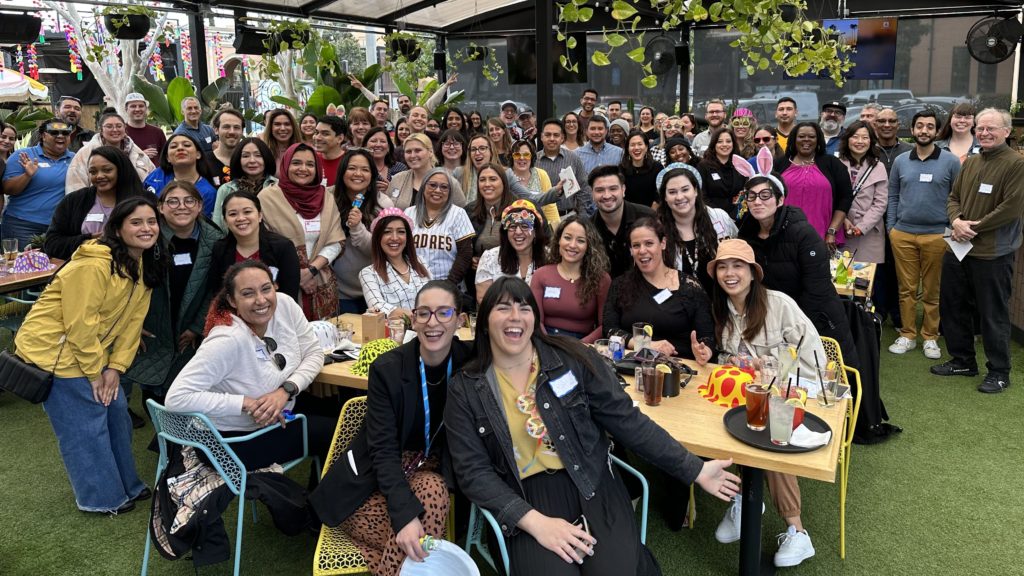
According to the Human Rights Campaign (HRC) Foundation, 46% of LGBTQ+ workers say they are closeted at work. The reasons for remaining closeted can range from working in an insensitive and unaccepting environment, to outright homophobic leadership. Ultimately, fear of coming out often stems from the history of threats of being terminated and violent acts being committed against LGBTQ+ individuals in and out of the workplace. The report also states that LGBTQ+ workers are hesitant to report harassment in the workplace because they don’t think complaints would be handled seriously and they don’t want to damage relationships with coworkers.
Feeling guarded at work hinders the ability to build trusting working relationships and can decrease morale and job satisfaction. Employees who don’t bring their full selves to work are more likely to feel their perspective is not of value, and they may hold back on making suggestions that could benefit the company and contribute to success.
We spoke with some of our LGBTQ+ staff at the San Diego Workforce Partnership about their experiences in the workplace. Below they share their experiences and offer advice on how both employers and employees can work together to create an inclusive workplace for LGBTQ+ individuals.
Madison’s Story

“The LGBTQ+ community’s existence is not some political statement. I did not come out to create controversy or to offend. My pronouns are an outward expression of my internal self. I feel fuller and more authentic identifying as genderqueer.”
How do you navigate being your authentic self at work?
As a genderqueer, bi individual who aesthetically looks like someone who fits into the gender binary and is in a heteronormative partnership, I exist in a sort of dichotomy at work between wanting to speak up and be seen for all the facets of who I am and wanting to just hide behind my socially acceptable outer façade—a privilege of my intersectionality, I understand.
What is a piece of advice you would give to employers looking to create an inclusive and accepting space for their LGBTQ+ employees?
Utilizing gender neutral terms, putting pronouns in email signatures and introducing yourself with your pronouns are all simple actions colleagues and employers can take (and have taken) to help make people feel accepted in their workplace. Employers who provide resources on gender diverse individuals to ensure those within the LGBTQ+ community are not expected to carry the burden of education is crucial. It is not our responsibility to justify why we should be respected or to prove that our identity is just that—our identity and not some offensive statement.
Educating yourself on those who identify differently from yourself is just kind of a requirement for being a decent human. It shouldn’t be that the only reason the LGBTQ+ community is recognized in the workplace is because there is a brave someone championing for that respect and visibility or that it is the month of June. We are here all year round—whether you know it or not—pursuing the same mission as everyone else.
Understanding the spectrum of gender identity is going to be crucial to ensuring a safe and welcoming workplace as we move into the next ten years. Taking actionable steps now to ensure acceptance in the office is only going to bring joy to the workplace for years to come.
Christopher’s Story

How do you navigate being your authentic self at work?
I think it takes continuous self-awareness. Especially for anyone who grew up in places and/or times that were much less accepting of LGBTQ+ identities, it’s very easy to instinctively want to avoid talking about that aspect of our lives in the workplace. You must constantly remind yourself that it’s okay to open up about your social life, family, spouse, etc. And in fact, it also helps others by tacitly reminding them that they are also free to be authentic about who they are at work.
What advice would you give to an LGBTQ+ students or young professionals entering the workforce?
I think they should see their LGBTQ+ identify as a strength, not a weakness. It’s not something to be hidden away or compartmentalized, but truly something that can and should help them in their career—by giving them perspectives that most of the workforce doesn’t directly have and a general empathy that can come from being part of a community that doesn’t fit into the traditional mold of society.
So much of our career success comes from playing to our strengths, so I encourage every young LGBTQ+ professional to harness these strengths because in the right workplace they can be invaluable. And spend as much time as possible time in workplaces that also see the value in your LGBTQ+ identify.
Ronald’s Story

How do you navigate being your authentic self at work?
As a gay and Black man, I live at the intersection of two historically marginalized groups, which means that my experience with authenticity at the workplace is that of most Black individuals in the workplace who were taught to code switch—adjusting one’s style of speech, appearance, behavior and expression in ways that will optimize the comfort of others in exchange for fair treatment, quality service and equal employment opportunities.
I also have the added consideration of how much of my queerness, such as my mannerisms and manner of dress to show—which can be regarded as effeminate. Deciding whether to paint my nails, wear form-fitting pants and even the type of bag I carry are all unique considerations I have had to ask myself before going to work. Because doing so could possibly mean being gawked at or thought less of.
It took me many years to get to a place where I was comfortable showing up as myself to work in a manner that does not have people gawk at me or think less of me. Ultimately, my answer came down to how I would feel about myself every time I looked in the mirror before leaving my house and whether I would recognize myself or see someone hiding. So today, I show up to work bringing my entire self and refuse to give up my sense of style to fit into some corporate image.
What advice would you give to an LGBTQ+ student or young professional entering the workforce?
Even though younger generations of job seekers prefer to work for places that align with their values, some are still willing to push aside their importance for a lucrative salary or job, especially when starting their careers. I would tell any LGBTQ+ student or young professional to continue to advocate for themselves in the workplace and to not surrender their values when looking for a job. By not standing firm on your beliefs and allowing misogynistic and homophobic behaviors to continue, it normalizes it for others, and over time, even yourself.
Resources for Employers and Professionals
If you are an employer looking to support your LGBTQ+ staff, we created a guide featuring tips on how to uplift your LGBTQIA+ employees year-round. For LGBTQIA+ professionals and allies, our workforce resource guide can help you determine an employer’s level of inclusivity and offer guidance on how to become an advocate for your community in the workplace.
